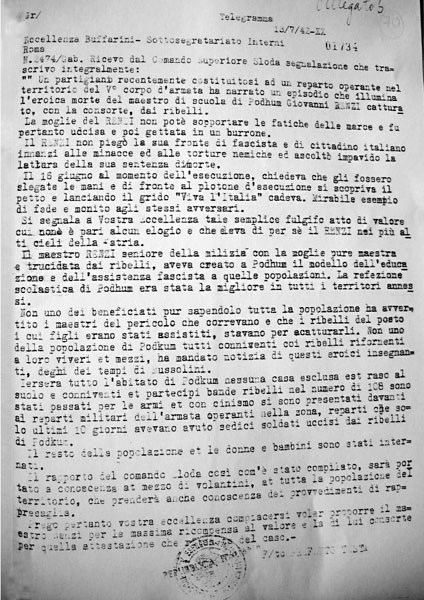storia
Italians bad people
by Antonio Senta
Time to do away with the rhetoric and hypocrisy of the myth of Italians good people.
"Italians ugly people. War crimes in the Balkans 1940-1943 "is the title of one of the interventions Berneri Circle of Reggio Emilia, for Memorial Day, January 27, 2012. Here it is.
|
It was the dawn of a day in the hot summer of 1942 in Podhum, a village in the inland town of Jelenje not too many miles from Rijeka. Rijeka, Rijeka does not, we should say, because the city was Italian; for the accuracy of the provincial capital of Kvarner, ruled by the head prefect of Themistocles, black shirt of the most convinced. And bloody. That day the Italian army, the police and the "Emilian squads" of Jelenje surrounded the village together formed the second army, led by the "black beast", General Mario Roatta. At eight o'clock raided the motorized infantry supported by tanks.
While some soldiers putting up posters on the walls signed by Head forbidding people to leave the house until ten o'clock in the evening, police and other soldiers penetrated into the houses by taking all without distinction. Zeljac Matejk, an old woman of sixty-seven seriously ill understood immediately what would happen when he heard kicking the door was beaten and dragged from home by force, then forced to walk to the countryside. Along with her were other old men, women and children had nothing with them, if not the image of the soldiers who looted their belongings, if not the face of those soldiers with flamethrowers on their shoulders set fire to their homes . Zeljac heard the cries and curses subdued, dominated by the screams of the Italian military, especially the terror felt fluttering in the air. In the evening we were taken up on the trucks in the direction of Rijeka. From there they were deported to concentration camps who were of Italian Bel Paese an open prison.
But a worse fate awaited the men. Were conducted at the airfield and the military was ordered to sit on the ground. Then the machine guns were placed around and at that moment there was total silence. I broke an aviation official wondered aloud to his superiors even if they were to be shot the workers employed at the airport. Major Mario Rampioni answered peremptorily: "following orders of the prefect: all"! That was when a policeman to call aloud the names first. Four. They stood up and were taken two hundred yards away, at the foot of a mountain. They were massacred by machine guns in two tanks. Then came the other fifteen names. Names correspond to which men of flesh and bones. Same scene brought a little 'further and then the sound, unmistakable, of machine guns. If we put too his last breath was done with guns. Ferdinand Barek was a boy of fifteen, but already a man for the Italian army. Witnessed the end of his companions, then it was the turn, along with nine others. Then to another group, then another, then ... There were those who cried, who fidgeted in every way, who gave him mad, who tried to escape, but there was never pity. Some residents of Podhum were forced under threat of arms to drag their comrades to the place of execution before being killed themselves.
No mercy for the living nor the dead. The lifeless bodies were robbed of watches, the purses, of every object of some value. At noon the artillery began to pound the houses of the country: the destruction was systematic. At the end of the day were at least one hundred and twenty of the shot, deported nearly two hundred families, five hundred buildings burned, more than a thousand head of cattle impounded. Of Podhum, village of fifteen hundred inhabitants, was left virtually nothing. Why all this? The Italian army of occupation accused the citizens of Podhum to be with those who had climbed the mountain and had given "the bush", with short, partisans and wanted therefore the terror of death suffocated the top national liberation movement .
 Antonio Senta
Antonio Senta
| 
|
Telegram from the prefect of the province of Quarnaro
Themistocles to the Head Secretary of the Interior Guido
Buffarini of July 13, 1942. After the killing by
partisans of Fascist schools and teacher of Giovanni
Renzi and his wife, known for their fanatical work
fascism of the population of Podhum, Testa
communicates to Buffarini: "Last night the entire village of Podhum
no home except the east razed and conniving et
rebel bands participating in the number of 108 were
passed by the weapons [...] The rest of the population et
women and children were interned " |
|
  
|